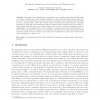Free Online Productivity Tools
i2Speak
i2Symbol
i2OCR
iTex2Img
iWeb2Print
iWeb2Shot
i2Type
iPdf2Split
iPdf2Merge
i2Bopomofo
i2Arabic
i2Style
i2Image
i2PDF
iLatex2Rtf
Sci2ools
133
Voted
WEA
2010
Springer
2010
Springer
Distributed Time-Dependent Contraction Hierarchies
Server based route planning in road networks is now powerful enough to find quickest paths in a matter of milliseconds, even if detailed information on time-dependent travel times is taken into account. However this requires huge amounts of memory on each query server and hours of preprocessing even for a medium sized country like Germany. This is a problem since global internet companies would like to work with transcontinental networks, detailed models of intersections, and regular repreprocessing that takes the current traffic situation into account. By giving a distributed memory parallelization of the arguably best current technique – time-dependent contraction hierarchies, we remove these bottlenecks. For example, on a medium size network 64 processes accelerate preprocessing by a factor of 28 to 160 seconds, reduce per process memory consumption by a factor of 10.5 and increase query throughput by a factor of 25. Key words: time-dependent shortest paths, distributed computati...
Algorithms | Time-dependent Contraction Hierarchies | Time-dependent Shortest Paths | Time-dependent Travel Times | WEA 2010 |
Related Content
| Added | 09 Jul 2010 |
| Updated | 09 Jul 2010 |
| Type | Conference |
| Year | 2010 |
| Where | WEA |
| Authors | Tim Kieritz, Dennis Luxen, Peter Sanders, Christian Vetter |
Comments (0)

